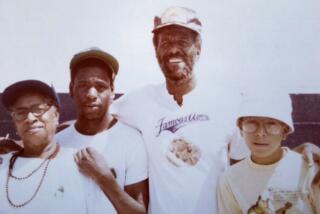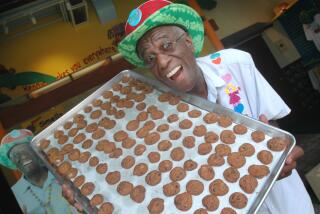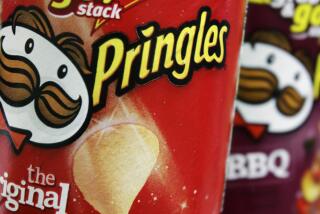M&Ms; Creator Forrest Mars Sr. Dies at Age 95
- Share via
Forrest Mars Sr., the notoriously secretive and quirky entrepreneur who built the candy empire famed for its Snickers bars and M&Ms;, has died. He was 95.
Mars, worth an estimated $4 billion and listed as the 30th richest man in America by Forbes last fall, died of natural causes Thursday night in Miami, said a spokeswoman for the McLean, Va.-based candy maker.
Founded in the kitchen of his parents’ Tacoma, Wash., home in 1911, Mars Inc. has bloomed into one of the world’s largest multinational corporations with estimated annual sales of $20 billion, selling brands from Skittles candies to Uncle Ben’s Rice and Pedigree pet food.
“His death has major implications for the confectionary industry worldwide,” said Joel Glenn Brenner, author of the recently published book “The Emperors of Chocolate: Inside the Secret World of Hershey and Mars.” The death of the fiercely private family patriarch, she said, “opens up an opportunity for [the company] to go public or for them to be sold.”
His loss also clouds succession at the corporation. Mars’ two sons, Forrest Jr. and John, had served as co-owners, but Brenner said Forrest Jr. quietly retired in April and noted there is no identified successor to John, who is in his 60s.
Brenner said Mars had been wheelchair-bound since he suffered a stroke in 1994, but still kept a close watch on the Goliath he built, where she said his son adheres strictly to his customs: even top executives punch time-cards, perks such as first-class air fare are verboten and pay is tied directly to the company’s performance.
“He set all that in place,” Brenner said. “Now, it’s a wide-open game.”
Forrest Mars was the only son of Ethel M. and Frank C. Mars, a struggling candy salesman. After his parents divorced when he was 6, he spent much of his youth with his grandparents in Canada. Frank Mars remarried and relocated to Minnesota.
Father and son were reunited years later, when Forrest--after a stint studying mining at UC Berkeley--joined a sales team touring the country to sell Camel cigarettes.
His father’s latest venture, a chocolate and caramel creation called the Mar-O-Bar, had met with only mild success. One day, while enjoying a malted milk at the local store, Forrest asked his dad, “Why don’t you put a chocolate-malted drink in a candy bar?” he told an interviewer years later.
“A short time afterwards, he had a candy bar,” Forrest Mars said. “Damn thing sold with no advertising.”
Frank Mars called his newly developed product, a malty nougat bar, the Milky Way. The next few years saw the birth of the Snickers bar and in 1932, the 3 Musketeers.
But his relationship with his father broke down in business disputes, and Forrest--armed with the foreign rights to Milky Way--set off on his own and settled in London. While abroad, he made his first foray into new ventures with the purchase of a small firm canning meat byproducts for dogs. Mars went on to establish a multibillion dollar pet food industry.
And while on a trip to the coast of Spain, he ran across soldiers who were eating chocolate bits covered with a hard-candy shell. Upon his return from Europe he created M&Ms;, which proved wildly successful and even found a place in the GI rations shipped to American soldiers fighting in World War II. (But Brenner said Mars’ own children, who have run the company since he left in 1973, were never allowed to eat them while growing up.)
Even after departing the company, Forrest Sr. kept a hand in the business. In the late 1970s he set up an experimental laboratory to pioneer liqueur-filled chocolates and founded the Ethel M company in Las Vegas, which he later sold to his sons. And Brenner said he recently had supported research intended to make cows produce leaner meat.
While Mars remains an international powerhouse and the top candy seller in the world, it has suffered some setbacks since he left.
Hershey Foods Corp. overtook it as America’s top candy maker in 1988. In a huge marketing blunder, Mars decided to veto a plan by Universal Studios to have an alien in an upcoming film called “E.T.” be led out of the brush by a trail of M&Ms.; Instead, the studio used Hershey’s similar Reese’s Pieces, which tripled sales after the movie’s release. And while its competitors have gobbled up smaller firms in a recent wave of consolidation, Mars remained somewhat isolated.
More to Read
Inside the business of entertainment
The Wide Shot brings you news, analysis and insights on everything from streaming wars to production — and what it all means for the future.
You may occasionally receive promotional content from the Los Angeles Times.










